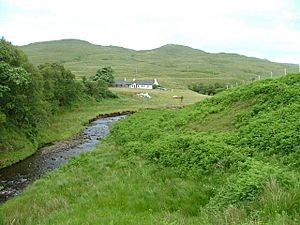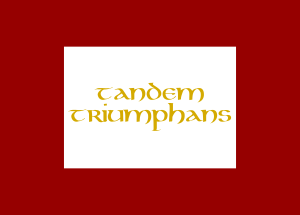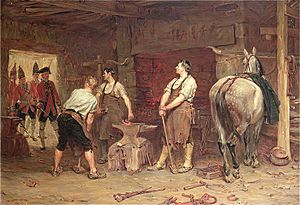Alasdair mac Mhaighstir Alasdair facts for kids
Alasdair mac Mhaighstir Alasdair (around 1698–1770), whose real name was Alexander MacDonald, was a very important Scottish war poet, writer, and lexicographer (someone who writes dictionaries).
His Gaelic name means "Alasdair, son of Reverend Alasdair." His father, who was also named Alasdair, was a clergyman. In English, his father was known as the "Reverend Alexander MacDonald."
Alasdair mac Mhaighstir Alasdair was born around the early 1700s in a house at Dalilea. His family was part of the Scottish nobility and the Clan MacDonald of Clanranald. His father was a church leader in Kilchoan.
Alasdair probably learned a lot at home from his father. He studied important old writings from Greece and Rome. He was also special because he could read and write in Scottish Gaelic, which was rare for people in the Highlands and Islands back then. He started writing Gaelic poetry very early.
Some people think he might have fought for Prince James Francis Edward Stuart in the Jacobite rising of 1715 when he was just a teenager.
While working as a teacher at a school in Kilchoan, he created the first non-religious book ever printed in Scottish Gaelic. It was called Leabhar a Theagasc Ainminnin (1741), which was a Gaelic-English dictionary.
Later, his poems about the Jacobite cause were read to Prince Charles Edward Stuart. These poems are believed to have helped convince the Prince to sail from France to Scotland and start the Jacobite rising of 1745. Alasdair mac Mhaighstir Alasdair fought as an officer in the Clanranald Regiment during this uprising. He was also chosen to teach Scottish Gaelic to the Prince because he was so good at the language. People called him "The Clanranald Bard."
After the Jacobite uprising was defeated at the Battle of Culloden, Alasdair and his older brother had to hide. They were outlaws until a special law was passed that pardoned them.
In 1751, Alasdair published his poetry collection called Ais-Eiridh na Sean Chánoin Albannaich (The Resurrection of the Old Scottish Language). This book openly attacked King George II and the government. Because of this, copies of the book were gathered up and burned by the public hangman. But luckily, twelve copies of the original book still exist today.
Alasdair mac Mhaighstir Alasdair was one of the most famous and important Gaelic poets of the 1700s. He died in Arisaig in 1770. He is still considered one of the two most important poets in the history of Scottish Gaelic literature.
A Scottish poet named Alan Riach said that Alasdair's poem Birlinn Chloinne Raghnaill ("The Birlinn of Clanranald") is "one of the great poems of world literature." This poem is about a sea journey. Riach also said that Alasdair was like ancient poets such as Homer and Virgil in his storytelling.
Another writer, Hamish MacPherson, said that Alasdair mac Mhaighstir Alasdair is one of the two greatest Scottish poets in any language. He also said it's a shame there isn't a national monument to him, because Alasdair helped keep the Gaelic language alive, much like Robert Burns did for the Scots language.
Contents
Early Life and Family
Alasdair mac Mhaighstir Alasdair was born around 1698. His family was part of the Scottish nobility and the Clan MacDonald of Clanranald. Through his great-grandmother, he was even related to Scottish Kings Robert the Bruce and Robert II.
His father, Maighstir Alasdair MacDhòmhnaill, was a church leader in Ardnamurchan and lived at Dalilea. He was also related to the famous Flora MacDonald. Alasdair's mother was from the Clan Maclachlan family.
At that time, many people in Ardnamurchan were Roman Catholics. The Protestant church was far away in Kilchoan. Alasdair's father would walk nearly thirty miles every Sunday to preach there and then walk back home.
After King James II was overthrown in 1688, the Church of Scotland changed. Alasdair's father refused to follow the new rules, but he was very popular, so no one could replace him.
Alasdair's father died in the 1720s and is buried on Finnan's Island in Loch Shiel.
Alasdair's older brother, Aonghas Beag MacDhòmhnaill, took over the family land. He married a Catholic woman and became Catholic himself. He led the men of Dalilea during the Jacobite Rising of 1745. He survived the Battle of Culloden and hid for two years before returning home.
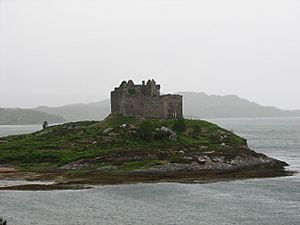
In 1914, a descendant of Alasdair's brother bought Castle Tioram, the old home of the Clanranald chiefs, and had it repaired. The old church at Kilchoan, where Alasdair's father served, is now in ruins, but the place where people were baptized can still be seen.
Education and Marriage
Alasdair was educated by his father because there were no schools nearby. He learned about ancient writings and the old ways of the Clanranald bards. He was also very good at the Irish language, which was a rare skill.
Around 1714, a new king, King George I, came to power in Britain. This led to a time when one political party, the Whigs, had almost complete control.
Alasdair later went to the University of Glasgow and the University of Edinburgh. He left without finishing his degree. Some people think he left because he got married to Jane MacDonald. Her family was also interested in literature. Alasdair wrote a poem praising his new wife. Others say he left because his family couldn't afford the university fees.
Alasdair was described as a tall, handsome man with fair hair. He was known for being honest and loyal to his friends and beliefs.
Working as a Teacher
In 1729, Alasdair became a teacher at a school on Finnan Island, near his home. He worked for a group called the Society in Scotland for Propagating Christian Knowledge (S.P.C.K.). His job was to teach in different places.
The S.P.C.K. built schools to help people in the Highlands and Islands. One of their goals was to make sure everyone spoke English. This meant Alasdair was told to teach only in English and punish students who spoke Gaelic.
However, Alasdair's work for the S.P.C.K. might have gone against his true feelings for his clan. Some think he might have had a disagreement with his clan chief, which led him to work for the S.P.C.K.
From 1738 to 1744, Alasdair taught at the school in Kilchoan, where his father used to be a church leader. He also earned extra money by farming.
In 1741, the S.P.C.K. asked him to create a Gaelic-English dictionary, which they published. This book helped Alasdair become even better at the Gaelic language. It was also the first non-religious book ever printed in Scottish Gaelic.
Some believe that creating this dictionary made Alasdair realize how important the Gaelic language was. This might have made him turn against the S.P.C.K. and their goal of replacing Gaelic with English.
By 1744, Alasdair's whereabouts were unknown to the S.P.C.K. They thought he had left his job to help the Jacobite clans. He was dismissed from his teaching position in July 1745.
Jacobite Officer and Poet
Alasdair's Jacobite songs, like "A New Song" and "A Song to the Prince," show how much he believed in the Jacobite cause. His war poems showed a deep understanding of politics and history.
These poems were sent to a banker in Paris, who read them aloud to Prince Charles Edward Stuart in English. These poems were very important in convincing the Prince to come to Scotland and start the Jacobite Rising of 1745.
On July 25, 1745, the Prince arrived in Scotland. Alasdair was one of the first people to meet him. He didn't know it was the Prince at first because he was dressed simply.
On August 19, 1745, Alasdair saw the Prince's flag being raised at Glenfinnan, which marked the start of the uprising. He sang a welcome song for the Prince. After that, he became known for inspiring people to join the Jacobite army.
Many of his poems praise the Jacobite cause and make fun of those who supported the other side, like the Clan Campbell.
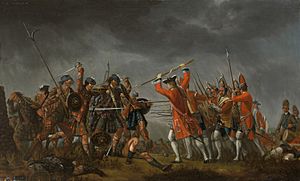
Alasdair was a captain in the Clanranald Regiment, leading 50 men he had recruited himself. He was also chosen to teach Scottish Gaelic to the Prince.
During this time, Alasdair became a Catholic, like his sister-in-law. He fought with the Clanranald men until the Jacobite forces were defeated at the Battle of Culloden.
After the Battle of Culloden
After the Battle of Culloden, Alasdair is believed to have stayed with the Prince for some time as he fled. The time after Culloden is known in the Highlands as Bliadhna nan Creach ("The Year of the Pillaging") because of the harsh treatment by the government soldiers.
After the Prince escaped to France, Alasdair and his brother had to hide. Their homes were looted by soldiers. Alasdair, his wife, and children wandered through the hills. His wife even gave birth to a daughter while they were in hiding.
Even though he faced criticism for becoming Catholic, Alasdair did not change his religion back, despite the harsh treatment of Catholics after the uprising.
Later, Alasdair was given a farm by the Clanranald chief. He lived there with his family until 1751.
Publishing His Poetry
Alasdair then went to Edinburgh to publish his book of poems, Ais-Eiridh na Sean Chánoin Albannaich (The Resurrection of the Old Scottish Language).
It was very brave of him to publish these poems, which were full of rebellion against the King, just five years after the Battle of Culloden. In the book's title, he called himself the "Bailie of Canna."
An Airce
Ais-Eiridh na Sean Chánoin Albannaich included a poem called An Airce ("The Ark"). This poem was a sharp satire aimed at the Whig party, especially the Clan Campbell.
In this poem, Alasdair makes fun of a common type of Jacobite poem. Instead of a beautiful woman, he meets the ghost of a Campbell who supported the Stuart kings. The ghost says the Campbells will be punished for betraying their true king. They will face plagues and a great flood.
The Bard is told to build an ark, like Noah. Moderate Campbells can come aboard after being "cleaned" of their Whig ideas. But soldiers who fought against the Jacobites are to be thrown overboard. A female poet who mocked Prince Charles is also to be punished.
|
|
The poem also mentions Colin Roy Campbell of Glenure, a government official. The ghost admits some respect for him but says he should be punished unless he names the rightful king.
|
|
Book's Impact
Alasdair's book also included translations of poems by a Royalist general from the English Civil War. This showed that Alasdair saw the Jacobite uprisings as a continuation of earlier fights for the Stuart kings.
Two poems in the collection were actually written by Alasdair's friend, Iain Mac Fhearchair. The book also included a poem where Alasdair asks the Nine Muses for help with his poetry.
Alasdair himself was not arrested, but the government seized and burned the unsold copies of his book in Edinburgh in 1752. However, the book inspired many other collections of Gaelic poetry to be published.
Hamish MacPherson said that Alasdair's book, being the first printed collection of Gaelic poetry, should make him highly respected, especially for his clever criticism of the ruling family.
Later Life and Death
Soon after his book was published, Alasdair was asked to leave his farm by the Clanranald chief. This was partly because a local Catholic priest, Father Harrison, didn't like Alasdair's political poetry. Father Harrison had shown loyalty to the government, which Alasdair saw as a betrayal.
Alasdair moved to Inverie and then to Morar. In Morar, he wrote a poem praising the area and the local Catholic bishop, priests, and students, who were more accepting of his poetry.
It is believed that Alasdair wrote his famous poem The Birlinn of Clanranald during the 1750s. This poem, about a sea journey, was not published until after his death. Writers say that Alasdair was a very skilled poet who knew many languages and was familiar with great ancient epics like those by Homer and Virgil.
The Clanranald chief later gave Alasdair land in Arisaig. He often visited his close friend, the bard Iain Mac Fhearchair, in North Uist.
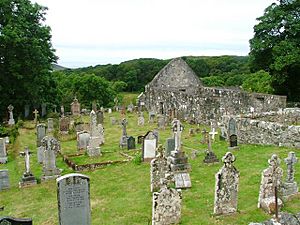
Alasdair mac Mhaighstir Alasdair died in Arisaig in 1770. According to local stories, on the night he died, he heard two friends reciting their own poems. Even though he was very ill, he sat up and gave them advice on how to improve their verses, even creating a few new lines himself. Then he lay back down and passed away.
He was buried in the cemetery of Kilmorie, near the Catholic church in Arisaig. Although the exact spot of his grave is unknown, a plaque was put up in 1927 to honor him as a great Gaelic poet.
Literary and Cultural Legacy
Alasdair mac Mhaighstir Alasdair is considered one of the greatest Scottish Gaelic poets, perhaps second only to Sorley MacLean from the 20th century. He was very original and didn't copy other poets much. Many of his poems are found in collections of Scottish poetry.
His high level of education, his ability to read and write Gaelic, and his knowledge of many languages and classic literature made him stand out from other great Gaelic poets of his time.
He was a man of strong opinions and deep feelings, but also very intelligent. He knew a lot about Gaelic traditions and was open to new ideas from his reading. He was both an innovator and someone who respected old ways, which made his poetry interesting and full of contrasts.
Long ago, many Gaelic speakers could recite Alasdair's long poem Birlinn Chloinne Raghnaill from memory. A rare first edition of his book Ais-eridh na Sean Chánoin Albannaich was even carried by a poet who moved to Nova Scotia in 1819. Only twelve copies of the original edition of this book are known to exist today.
Alasdair's influence on Scottish culture continues. His songs are still performed today. For example, his song "Another Song to the Prince" was performed at a festival in Edinburgh in 1951 and has even been used in the TV series Outlander.
With the rise of Scottish nationalism and efforts to bring the Gaelic language back through schools, interest in Alasdair mac Mhaighstir Alasdair has grown. Even though he supported the monarchy, he is now influencing people who want Scottish independence.
Hamish MacPherson believes it's a "national disgrace" that there's no national monument to Alasdair. He sees Alasdair as an example for Scots who believe in independence, as someone who found his true beliefs and fought for them with his words.
Descendants
Alasdair's son, Raonuill Dubh MacDhòmhnuill (around 1715-1805), was also a famous Gaelic poet. He published a collection of poems in 1776, which included many oral poems collected by his father.
Raonuill Dubh and his son were hereditary landowners on the island of Eigg. During the Highland Clearances in the 1820s, Alasdair's grandson tried to evict a whole village to make way for sheep. However, his family faced hardships, and the evictions were stopped.
Alasdair mac Mhaighstir Alasdair's last direct descendant, Angus R. MacDonald, moved to the United States. He fought in the American Civil War and was wounded. He never married, and so the direct family line of the Bard ended.
Folklore
- Many ghost stories in the Hebrides tell of sightings of Alasdair mac Mhaighstir Alasdair's ghost.
- A story from the island of Canna tells of Alasdair meeting some old men fishing. He joked about them, saying:
|
|
Images for kids
See also
 In Spanish: Alasdair mac Mhaighstir Alasdair para niños
In Spanish: Alasdair mac Mhaighstir Alasdair para niños
 | Jessica Watkins |
 | Robert Henry Lawrence Jr. |
 | Mae Jemison |
 | Sian Proctor |
 | Guion Bluford |


